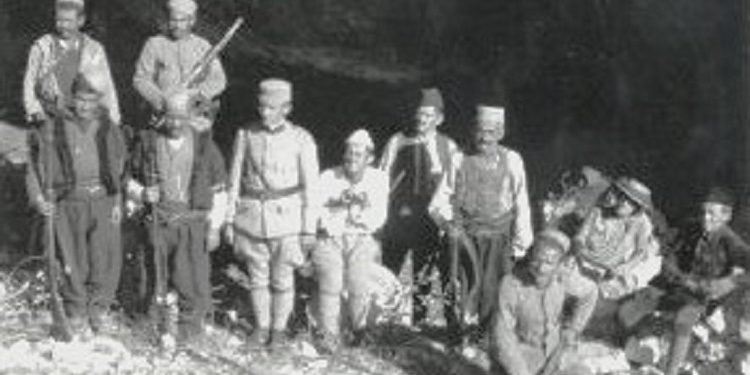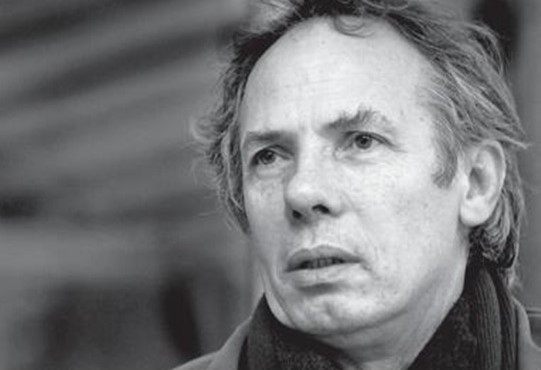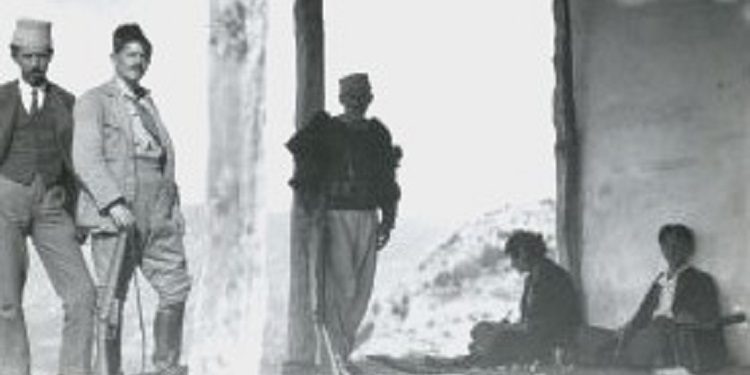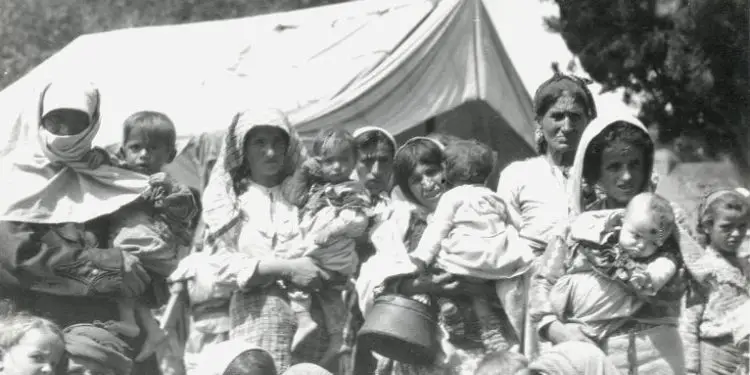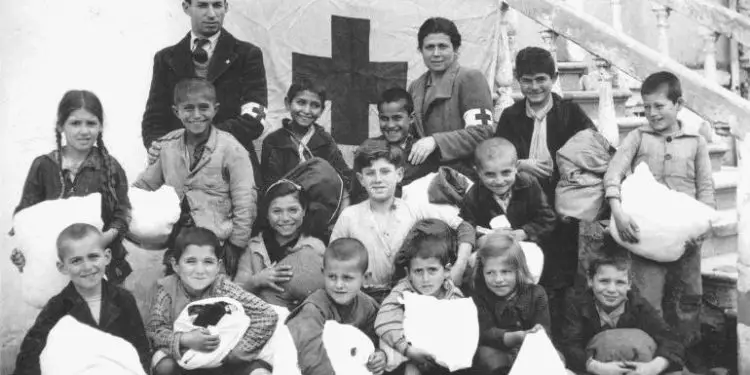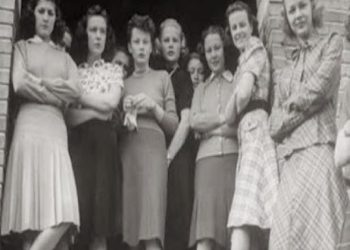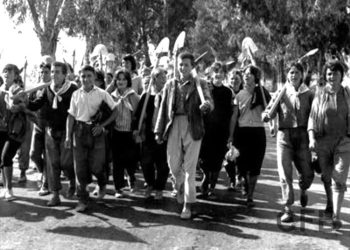By Luan Rama
– Albania in the 1920s, in the heart of Eugène and Helene Pittard –
Memorie.al / The various historical books published, especially in the last two decades, have highlighted many personalities from the European and transatlantic world, who have dedicated themselves to Albania in its most difficult moments – after the creation of the Albanian state by Ismail Qemal Vlora and other Albanian leaders. It was a time when Albania had to fight against the chauvinistic policies of its neighbors, as well as the hegemonic policies of the great countries. Two of these figures were also the Swiss Eugene and Helene Pittard. The voluminous book of a thousand pages by publicist Kudret Isaj has been published, with the title “The Last Journey of Eugene and Helene Pittard: The Creation of the Albanian Red Cross, Geneva-Tirana”, for which the author had to work for 10 years and search the archives of Switzerland, or those of the family and beyond.
Ten years of work that were crowned with a book published by “Les Livres Rama”, which shows us not only their lives and activities for Albania, but also the Albanian world of the 1920s-1930s of the 20th century. Undoubtedly, the main figure is that of Eugene Pittard, an academic and anthropologist known in European circles, but also a great humanist and politician, who strongly helped in the creation of the Albanian Red Cross and who later, in 1924, was the delegate of the League of Nations for the distribution of aid in northern Albania, during the time of the bread crisis of 1924.
But, Pittard was at the same time an ardent defender of the Albanian cause in the international arena, especially for the admission of Albania to the League of Nations and in the defense of Albanian demands against Serbian chauvinist politics. But, in addition to this, the author leaves a special place to Mrs. Helene Pittard, a well-known journalist and writer, who accompanied her husband to all Albanian regions in a very difficult socio-political time, but also on extremely difficult journeys through the mountains, which remind us of the travels of Edith Durham.
Helene Pittard or Dufour by her family, was the daughter of a well-known aristocrat of Geneva, a politician and well-known in cultural circles. Helene, who in her youth had a passion for poetry and the experience she spent during several years in London launched her into journalistic writing. Later she was a correspondent for the “Journal de Geneve” for art and as a young woman began publishing her first novels. But she devoted a special interest to Albania.
They made their first trip to Albania in 1910. And here is how the author Kudret Isaj describes it, when they landed in Shkodra on July 2 of that year: “The owner of the ‘Grand’ Hotel, to express his hospitality, invited the Swiss friends to drink something refreshing on the hotel veranda. A few moments later, the waiter approached with a crystal tray in his hands and treated the customers to a cold rose syrup and Turkish coffee. Before they sat down to eat lunch in the hotel restaurant, they witnessed a typical oriental scene.
As soon as they took their seats at the table, a waiter approached them holding a red copper kettle and a basin of the same material. The waiter, bending in a half-bow, brought them the kettle with water so that they could wash their lips and hands with atari perfumed water, a rose essence that was used everywhere at that time in the hotels and restaurants of Shkodra. After the guests washed their hands, the owner of the ‘Grand’ Hotel, whom they called Sokrat Shkreli, approached Eugene Pittardi and his wife and placed a bottle of white wine on the table, saying: ‘This bottle of wine you have is from the grapes of my garden. I have a watch that I have lowered this bottle into the well with a winch and cooled it for your master.
We don’t have a refrigerator in our hotel yet. Don’t worry about the missing label on the wine bottle. I’ll be your guarantor with my life if anything happens to you.’ ‘My wife Mici is Austrian,’ continued Sokrat Shkreli. ‘Can you believe she cooks carp casserole like a real Shkodra woman?! She learned it from a friend of hers, the cousin of Cuk Marku, the king of carp casserole, who had a restaurant in the old bazaar at Ura e Bunës. Our great-grandfathers say that a Shaban Baku, during the Turkish era, was famous in Shkodra for cooking carp casserole and served as a chef in the Sultan’s Court in the 1800s.
The Shkodra people of that time baked carp on a hot tile.’ “While the carp casserole is baking in the oven,” continues Sokrat Shkreli, the owner of the ‘Grand’ Hotel, “I’m going to tell you a little story, because in Shkodra we can’t wait for the friend who knocks on our door any other way. As you know, the people of Shkodra have a sense of humor and are dying to tell jokes.” “A doctor told me,” Sokrat Shkreli concludes his story, “that a smile activates 17 facial muscles. I won’t let you go to Switzerland without teaching you a Shkodra joke.”
“Not far from the ‘Grand’ Hotel, in a garden with grapes, pomegranates and figs, the sweet sounds of a violin could be heard. A group of men in frocks were loudly singing a melodious song, whose ions entered all the houses in the neighborhood without knocking. Helena for a moment moved the group of men from Shkodra to Geneva in her mind and thought that in Calvin’s city, they would certainly have been prosecuted for disturbing the public peace, and would even have paid a hefty bill. Meanwhile, here, the mayor of Beledija (mayor), Muharrem Gjylbegu, could congratulate them on the revival of the city’s cultural life.
Helena, extremely curious, asked Sokrat Shkreli to tell her in two words what the content of that song was that those men were singing with such passion! Helena found it impossible not to openly express her surprise when the owner of the ‘Grand’ Hotel explained to her that those men were singing a hymn to the roses of Shkodra. After resting a little from the heat of the first days of July 1910, Eugene Pittard and his wife set off for the Austro-Hungarian Consulate, which also served as the residence of the consul Adolph Ritter von Zambaur…”!
One of the interesting meetings with the city’s personalities, as was the one with Kel Marubi, was the meeting with Kolë Idromeno, with whom she published an interview unknown until now in Albanian historiography. Helene Pittard asks him about his art and, in particular, about the history of the “Our Lady of Shkodra” and the city’s cathedral built in 1848. Idromeno tells her about Marin Barleti and Skanderbeg’s journey to Italy, about the flight of the fresco from the cathedral to the church of Genesano near Rome, on April 25, 1467, to pray to the Pope to help Skanderbeg. And, finally, the return of the image of the “Our Lady of Shkodra” Shkodra”.
Idromeno tells him about the 1905 earthquake and the restoration of the church dome, he remembers how his father Arseni helped him when he was tied with ropes to create the fresco of Saint Mary with the baby Jesus and how, to paint this fresco, he had gone all the way to the church of Genesano and how for ten days he looked at it continuously with tears in his eyes. On his way back, he had painted the fresco in the Augustinian church near the castle.
Of great interest would be their meeting with Father Gjergj Fishta, on April 14, 1924, years later. “Father Gjergj Fishta,” the author writes, “told the Pittards about the Albanian inhabitants of the Hoti and Gruda mountains, whom the unjust division of borders left under the administration of Montenegro”! “To escape massacres and reprisals, hundreds of inhabitants of this region,” Gjergj Fishta continued, “have recently come as refugees to Shkodra, to seek help and food.” “The refugees,” he continued, “are disappointed, because they have heard that injustices are being committed in the distribution of food aid.”
Noëlle Roger (Helene Pittard), describes in her diary the scene when Father Gjergj Fishta was accompanying them, when they were distributing shirts to a group of refugees. Suddenly another group of refugees who had not been able to get shirts, their eyes were darkened with anger to such a degree that they began to attack and overturn the car, inside which Eugene Pittard and his wife were. The first thought that immediately came to Father Gjergj Fishta’s mind, was to protect the Swiss friends and to make it clear to the uncontrollable crowd, that foreign friends are protected with their lives and that they could only pass over his body.
It would be Father Gjergj Fishta who would come face to face with the crowd, consumed by blind hatred and in the name of the father, the son and the holy spirit, as well as his Albanian genius, would become a barricade in front of them. By browsing the diary of Helene Pittard (Noëlle Roger), we reluctantly get acquainted with the itinerary of the trips that Eugene Pittard and his wife made to various regions of northern Albania. From the first days of their stay in Shkodra, the Pittards visited the villages of Kastrat, Boriç, Koplik, Hot, Prekal, Dukagjin.
On April 10, 1924, the Pittards left Shkodra behind and set off towards Puka, to verify the lists of residents in need and to distribute food and clothing aid. The road stretched between the mountains on dangerous paths, on the edge of abysses, so it was impossible to get to Puka by car. Even though the owner of the “Evropa” Hotel told the Pittards that to get to Puka, they had to count on a 14-hour journey by horse, they did not back down from their decision. The Drin River had fortunately not been flooded by the spring rains, so they crossed the river on horseback.
The cold weather and the drop in temperatures made it impossible for Eugene Pittard and his wife to continue their journey towards Kukës. On the way back, they crossed the Drin River by boat, since according to the guide, crossing by horse was impossible due to the heavy rains.
The year 1921 was for Helene Pittard, a year of great impressions, especially in Shkodër, Tirana, Vlorë, Gjirokastër, Pogradec, and Kolonjë, where they were enthusiastically welcomed by the Albanian people and politicians. With the creation of the Albanian Red Cross, like Eugene Pittard, Helene was also elected Honorary President of the new Albanian institution, in aid of the population. That same year, during a trip to Korça, she met Themistokl Gërmenji’s wife, Evdhoksinia, who was the president of the women’s association “Perlindja”.
The Pittard couple, upon their return, even contacted a French lawyer to reopen the trial regarding Themistokl’s unjust conviction, since some judges had not agreed with this harsh decision, made immediately after a letter from Prime Minister Venizelos to the French government.
The year 1924 was very difficult for the Pittard couple. Albania was experiencing a food crisis, especially in the north, and Helena had to travel by horse to the northern mountains for days, to go to the Dukagjin area, to Prekal, Gomsiqe, etc., which are captured in numerous photographs from this time. During these years, Helene Pittard sensitized in a sensitive way the European donations with which she collaborated, such as the ‘Lady Carnavon’ foundation, the Council of Great Britain, the “Save the Children” fund in London, as well as the Vatican.
In Albania we always see her among the mountain women distributing corn, clothing, medicine for the sick. In Shkodra she placed orders with the city’s tailors, to sew clothes and shirts for the poor. The photographs from this time are truly moving. From time to time, in places where they rest for a moment, her figure is seen taking out her diary and writing down the impressions of the day.
Helene Pittard was one of the first feminists and a great humanist, similar to Edith Durham. As a publicist and writer, she chose the pseudonym “Noëlle Roger”, which was related to the names of her two brothers. In addition to her 54 novels and novellas, she also wrote plays for the theater, such as the play “The Abduction of Europe”, performed in Geneva and Paris and which was related to the legend of ancient times.
Her name is also found in various newspapers of these years. For all her activity, she was also honored by France, with the Medal of the Academy, as well as the Legion of Honor. Likewise, she was honored with prizes and medals from Romania or literary and humanist foundations of Europe. For Albania, she undoubtedly remains a figure not only humanistic, but also literary that must be discovered. Memorie.al




